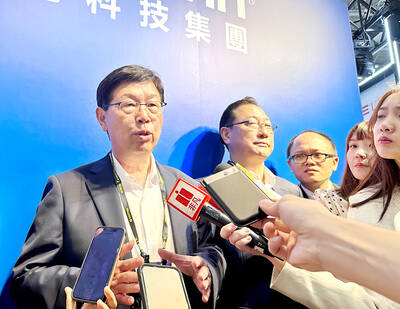China Evergrande Group’s (恆大集團) electric vehicle (EV) unit jumped in Hong Kong trading after the chairman of the indebted property giant said that making such vehicles would become its main business within a decade.
Shares of China Evergrande New Energy Vehicle Group Ltd (Evergrande NEV, 恆大新能源汽車) yesterday climbed as much as 17 percent, the most in three weeks.
Evergrande rose 6 percent before paring the gain to 0.7 percent at 3:01pm.
The Securities Times on Friday reported that Evergrande chairman Xu Jiayin (許家印), or Hui Ka Yan in Cantonese, said he plans to scale down real-estate operations to focus on new energy vehicles.
CHALLENGES
The reported shift to the EV business would be a challenge, given that the firm has yet to deliver a single vehicle, despite Hui’s ambitions to take on Tesla Inc.
The world’s most indebted developer is struggling with a cash crisis that has led it to consider selling stakes in units, including Evergrande NEV.
Evergrande NEV was up 11 percent in afternoon trading, but remained about 94 percent off its peak in February.
The company last month warned of a “serious shortage of funds” and said there was no guarantee it could meet financial obligations.
The liquidity shortage meant that it stopped paying some operating expenses and some of its suppliers turned away.
The company’s first electric vehicle — “Hengchi” — is to be delivered from its Tianjin factory at the start of next year, according to an Oct. 11 statement on Evergrande’s Web site, which also referred to a “three-month war” to tackle the main challenges in EVs.
In August, the company said that it might need to delay mass production of vehicles unless it could secure more capital in the short term.
Evergrande, which also has operations ranging from a soccer club to mineral water, has been criticized by the Chinese central bank for “failing to manage its business well.”
CRITICISM
In a usually harsh comment, People’s Bank of China financial markets department deputy head Zou Lan (鄒瀾) earlier this month said the developer “blindly expanded and diversified” over the past few years, instead of operating prudently amid changing market conditions.
Evergrande spent more than US$3.7 billion on an array of EV-related companies after announcing in 2019 that it wanted to be the world’s premier manufacturer of green vehicles.
NO CASH
That has yet to pay off, with Evergrande NEV reporting a 4.8 billion yuan (US$752.23 million) loss in the first half of this year.
Last month, the unit scrapped a proposed listing on Shanghai’s Star board.
In principle, Evergrande is not to buy land over the next 10 years, Hui told an internal meeting, according to the Securities Times report.
Annual sales of real estate would drop to about 200 billion yuan in 10 years from 700 billion yuan last year, he was quoted as saying.
Evergrande declined to comment, but has said that construction at more than 40 projects in Guangdong Province in China is proceeding smoothly and that the homes are to be delivered to purchasers.
The developer owes more than US$300 billion to banks, bondholders, suppliers and investors.
Last week, the company pulled back from the brink of default when it paid an US$83.5 million bond coupon just before the deadline.

Taiwan Transport and Storage Corp (TTS, 台灣通運倉儲) yesterday unveiled its first electric tractor unit — manufactured by Volvo Trucks — in a ceremony in Taipei, and said the unit would soon be used to transport cement produced by Taiwan Cement Corp (TCC, 台灣水泥). Both TTS and TCC belong to TCC International Holdings Ltd (台泥國際集團). With the electric tractor unit, the Taipei-based cement firm would become the first in Taiwan to use electric vehicles to transport construction materials. TTS chairman Koo Kung-yi (辜公怡), Volvo Trucks vice president of sales and marketing Johan Selven, TCC president Roman Cheng (程耀輝) and Taikoo Motors Group

Among the rows of vibrators, rubber torsos and leather harnesses at a Chinese sex toys exhibition in Shanghai this weekend, the beginnings of an artificial intelligence (AI)-driven shift in the industry quietly pulsed. China manufactures about 70 percent of the world’s sex toys, most of it the “hardware” on display at the fair — whether that be technicolor tentacled dildos or hyper-realistic personalized silicone dolls. Yet smart toys have been rising in popularity for some time. Many major European and US brands already offer tech-enhanced products that can enable long-distance love, monitor well-being and even bring people one step closer to

RECORD-BREAKING: TSMC’s net profit last quarter beat market expectations by expanding 8.9% and it was the best first-quarter profit in the chipmaker’s history Taiwan Semiconductor Manufacturing Co (TSMC, 台積電), which counts Nvidia Corp as a key customer, yesterday said that artificial intelligence (AI) server chip revenue is set to more than double this year from last year amid rising demand. The chipmaker expects the growth momentum to continue in the next five years with an annual compound growth rate of 50 percent, TSMC chief executive officer C.C. Wei (魏哲家) told investors yesterday. By 2028, AI chips’ contribution to revenue would climb to about 20 percent from a percentage in the low teens, Wei said. “Almost all the AI innovators are working with TSMC to address the

FUTURE PLANS: Although the electric vehicle market is getting more competitive, Hon Hai would stick to its goal of seizing a 5 percent share globally, Young Liu said Hon Hai Precision Industry Co (鴻海精密), a major iPhone assembler and supplier of artificial intelligence (AI) servers powered by Nvidia Corp’s chips, yesterday said it has introduced a rotating chief executive structure as part of the company’s efforts to cultivate future leaders and to enhance corporate governance. The 50-year-old contract electronics maker reported sizable revenue of NT$6.16 trillion (US$189.67 billion) last year. Hon Hai, also known as Foxconn Technology Group (富士康科技集團), has been under the control of one man almost since its inception. A rotating CEO system is a rarity among Taiwanese businesses. Hon Hai has given leaders of the company’s six